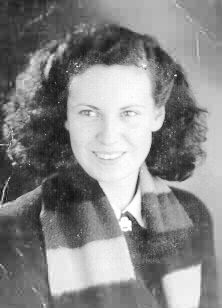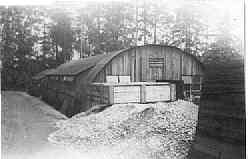03
03
 03
03
click for full size
|
1942 to 1944
Winifred's recollections of student life in Belfast before we met
|
|
|
|
|
for Dick
|
| Links
|
|
|
|
|
|
|
the school I went to:
see page 10-11
for more about the blitz
|
Had I not injured my back when I was barely seventeen I might never have met Dick Sillitto and discovered that physics is fascinating, too. Here’s how it came about.
Beginnings
June 1941 was my last month at school. I was glad to leave, though I had thoroughly enjoyed my eleven and a half years there. My chemistry teacher had me lined up for a technician job at the Linen Research Institute, a much better idea than joining my father’s accountancy practice; but first there would be a family holiday.
We met up in a rented house in Portstewart, my father, my 15-year-old brother and myself from Belfast, my mother and young brother and sister from an aunt’s farm near Limavady where they had found refuge from the blitz.
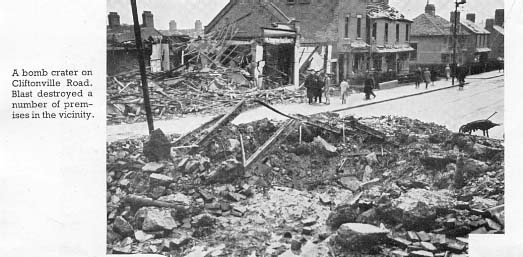 April 1941: our corner shops; picture by Belfast Telegraph photographer April 1941: our corner shops; picture by Belfast Telegraph photographer
Looking back, I realise what a selfish child I was, unaware of the terrible emotional trauma my mother suffered those three months far from home, wondering every night if we were safe and never having had a chance for a proper talk about the night our house was damaged and some of our neighbours killed.
The July sun shone, several of my friends were in Portstewart too, and our favourite game of ‘follow my leader’ involved plunging into the sea, swimming ashore, and climbing back to one of the diving boards on the rocks, all at speed. One day, I was leader and I went up to the highest board. It seemed very dead, so next time I gave an extra strong bounce, not realising a follower had been just behind me the previous time but was not so close now. And instead of letting myself somersault as my legs arched over my head, I strained every nerve and sinew to bring them back. I was a bit winded when I hit the water, but swam back and mentioned it to no-one.
Over the next week or so, I felt more and more tired until one day I had to climb the last stretch of a flight of steps between two streets on my hands and knees.
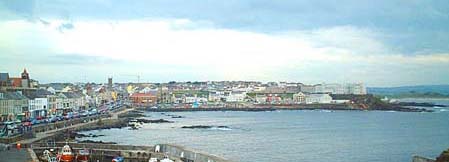 Portstewart, from an old postcard Portstewart, from an old postcard
When I reached the house I could not even begin to go up the stairs. My harassed mother did not believe me, but my father -- a gentle, considerate man, nine years older than my passionate impulsive mother -- helped me to bed. I slept feverishly for two or three days. When I felt better, I found I could not sit up, and the next six weeks were spent in hospital in Belfast.
So there I was in late September, lying on my own bed in our sunny dining-room, reading John Buchan and dreaming of my boyfriend. Not a boyfriend in the modern sense, you understand. Tall, dark, and the only one of my schoolmates to share my pleasure in the theory of the atom, he had walked me home one night in June when we both happened to be on firewatch duty, and said goodnight with a quick kiss at the garden gate. I wrote to him from my hospital bed. He replied that he could not bear to see me ill but would visit me when I got home.
He did. Whether it was meeting my downs syndrome sister, or being persuaded to play our piano by my mother (I was mortified -- I knew what he thought of untuned pianos) or just me still immobile, I never knew. I only ever saw him once again, and that was three years later.
More important was what he told me about his future plans. He had been awarded a bursary to study electronics (we called it ‘radio’ then) for two years, after which he would help the war effort. In the event he joined the army after one year, but I recalled what he had told me the following spring, when my father was suggesting accountancy again, and sent off an application.
I was interviewed by a civil servant with piercing blue eyes – C. P. Snow, I learned later. The deal was £50 per annum for two years to study ‘physics with radio’ in the Engineering Faculty of Queen’s University, and an ordinary BSc after a year’s experience in some technical type of war work. When the war was over, we could return to complete an honours degree. In the waiting room I had my first ever conversation with a Catholic, a likeable lad who later delighted the class by answering "Exactly! " when the most serious student asked, anent cosmic rays, "where the hell do they come from ?"
|
|
|
That first autumn term we became a close-knit group, two girls and seven boys, learning the art of soldering under a stereotype ex-RAF sergeant. Our Adviser of Studies was a quiet man with my father’s twinkling eyes and tongue-in-cheek Belfast humour. The first thing he advised us was "make your work your hobby", before describing exactly how he drilled a hole in his bedroom window for the aerial to go through. A keen radio ham all his life, T P Allen later became the University's first Professor of Electronics.
Our various first-year classes filled a 9 to 5 day in the city centre College of Art and Technology. Some were shared with chemical engineering students and a horde of ‘rude mechanicals’ and civil engineers. For maths tutorials we sat in alternate rows in a huge tiered lecture theatre, assistants working their way round as we tackled the set problems. I was often out of my depth and hid my work in tongue-tied embarrassment. The same room was used at 2 p.m. for lectures on DC machines, memorable for the lecturer’s attachment to a bottled lunch.
Alcohol was not then the important feature of university life that it seems to be now. The top floor of Campbell’s Coffee House, opposite the City Hall, was our howff. For the mid-day main meal of the day, I often went the two miles home, but sometimes we ventured into a spartan ‘British restaurant’ nearby in the Falls Road for a low-price nutritious but uninspiring meal. Then we would wander round Smithfield market, a great place for second-hand electronic components.
Physics was very much the poor relation. The lecturer was a man ‘from the south’, and we sat round a laboratory bench while he talked; no textbook was recommended. Natives of Belfast rate practical people higher than ‘airy-fairy theorists’ and I’m afraid we were not thrilled with his physics. Still, eight of us passed all the year-end exams. The one who failed had been more interested in sexual harassment, so we were glad when he did not appear for second year. Thereafter we went for physics to the main campus, 2 miles away in the opposite direction to my home; a very different experience culminating in an intensive course in glass-blowing. Professor KG Emeléus’ lectures were interesting, but without a textbook there was a great deal I did not understand, and failed the end-of-year exam. However, I could resit a year later. The time had come to venture ‘across the water’.
On the quay for the Heysham boat, my parents assured me of their love and trust in my good sense. That made it easy to cope with a few sad moments as I watched the dark silhouette of the Cave Hill shrinking into the dusk. Betty and I were bound for the Admiralty Signals Establishment in Haslemere, Surrey.
 The train journey to London next day was memorable only for our first sighting of a coalmine. Not due in Haslemere for 2 days, I remembered that the Girl Guide Association had a hostel in Buckingham Palace Road. We went there and found a warm welcome; and a brief air-raid alert in the night. I fell in love with London’s white terraces and green parks, and said as much in a letter home. Next afternoon we visited relatives of Betty’s in a western suburb, to discover that our parents had been telephoning frantically, thinking us lost. I am still ashamed that neither of us had thought to phone home, but long-distance calls were intimidating in those days.
The most mature and ambitious of our fellow students also went to Haslemere, to a group developing dielectric aerials. Son of a country schoolmaster, he was descended from the Flemish refugees who initiated the linen industry, and quickly rose to the top; eventually he became head of the Establishment, by then back in Portsdown.
Betty and I did not have distinguished careers. We started in the Library, not my cup of tea so I was put onto transformer testing. Two months of that made me rebellious, and after the Christmas vacation I worked in one of the research laboratories.
This lab was a hut on the former cricket pitch of the country house which the Admiralty had commandeered when Portsmouth became a target for enemy bombs. On the first Saturday in January, 1945, I happened to be leaving it just as a young man left a neighbouring hut. As our paths converged, he raised his cap and said
"Are you going to lunch, Miss McMillan?"
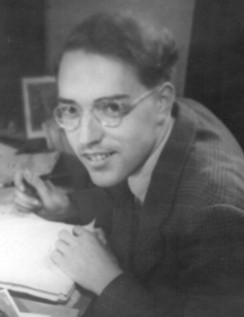
Happy 80th Birthday, darling!
WS, Dunbar, 3 March 2003
|
|
|
We left ASE in July, 1946; Dick returned to Edinburgh while I went back to Belfast and within the year converted my unclassified BSc to a 2.1 Honours in Experimental Physics. We were married there on the 12th day of September, 1947.
|
|
|
|
|
|
 03
03



